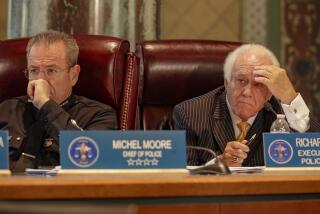Landlord can’t just waltz into apartment
- Share via
Question: My landlord enters my apartment, usually when I’m not home, and doesn’t even leave a note. Can landlords do that?
Answer: It depends on the situation. If there’s an emergency, yes. Just because they feel like it, usually not. According to Janet Portman, author of “Every Tenant’s Legal Guide,” there are five broad reasons a landlord may enter the rental premises: emergencies, inspections, repairs, showings to prospective tenants and during a tenant’s extended absence.
Although usually governed by state law, which varies widely, landlord entry specifically for emergencies is allowed in all 50 states. What’s an emergency? Any situation that requires immediate attention. Flooding, fire or a resident’s sudden disappearance fall into that category.
A sudden or prolonged disappearance may warrant an emergency visit, especially if the landlord gets a call from the tenant’s family or friends.
In non-emergency situations, when can landlords send in the repair folks? They may enter after giving tenants fair notice, which ranges by state laws from “reasonable notice” to 48 hours -- the longest -- for Vermont. The average is 24 hours, including in California. Repair visits should be limited to normal business hours, unless otherwise arranged with mutual consent.
Being at home during a serviceman’s visit is always a good idea, particularly if you have pets. Be smart and don’t leave valuables, such as cash, jewelry or keys, lying around.
Some landlords have a regular schedule for inspections and maintenance. If the inspections overstep the bounds of logic, including visits that are unannounced or too frequent, let the landlord know your concerns.
In addition, some cities now require health and safety inspections for rental units. In L.A., these take place once every three years and apply to buildings with two or more rental units.
Entry notice should be provided to you in writing. Inspectors usually look for various health and safety items, including peeling paint, improperly barred windows, smoke alarms and illegal additions.
Another entry situation occurs when your apartment is up for rent. Showings often are a touchy topic for tenants who value their privacy. Let the landlord know when it’s not convenient, such as after 6 p.m. or on weekends before 11 a.m. Decide how much warning you need before they show up, and be cooperative.
The last entry situation involves tenants who are absent for extended periods. Be sure the landlord has an emergency contact to avoid unnecessary entry.
Regardless of the situation, if you think your privacy is being violated, talk with your landlord. If the entries are unreasonable, you may have to see an attorney.
Reader comments may be sent to hmayspitz@aol.com.
More to Read
Sign up for Essential California
The most important California stories and recommendations in your inbox every morning.
You may occasionally receive promotional content from the Los Angeles Times.






